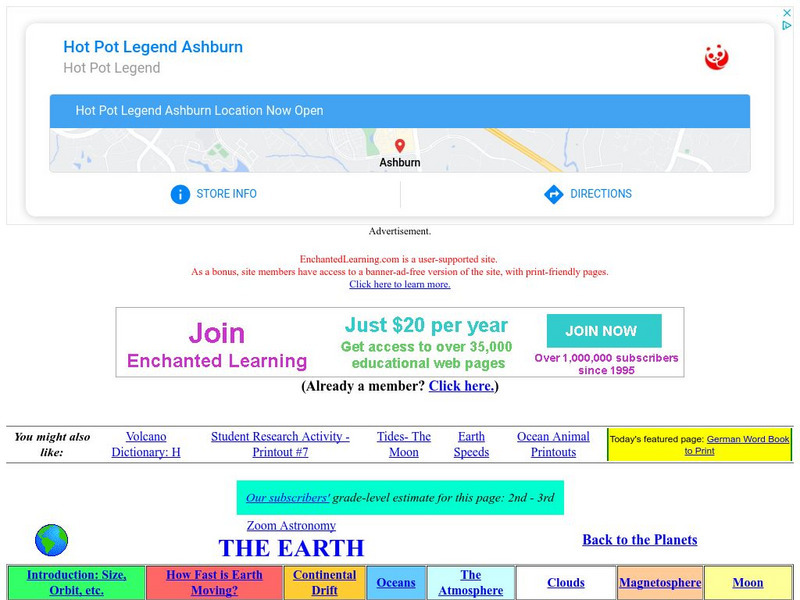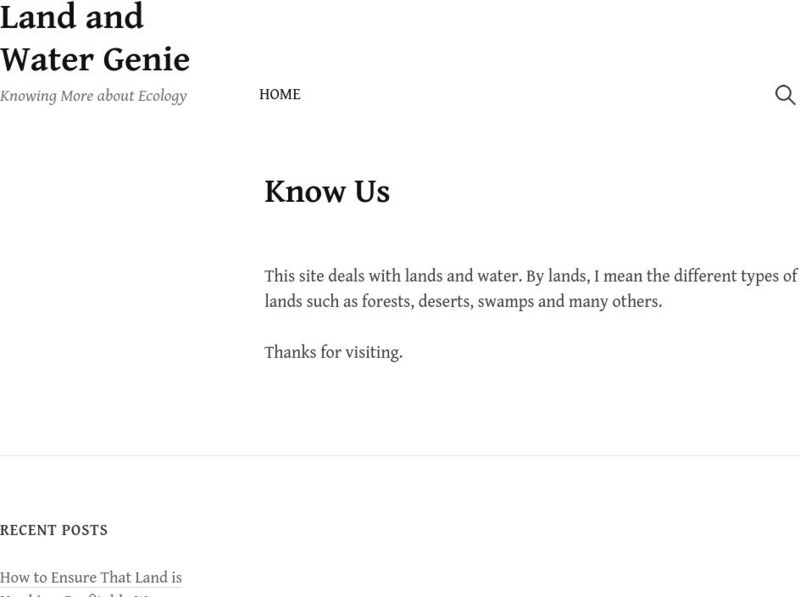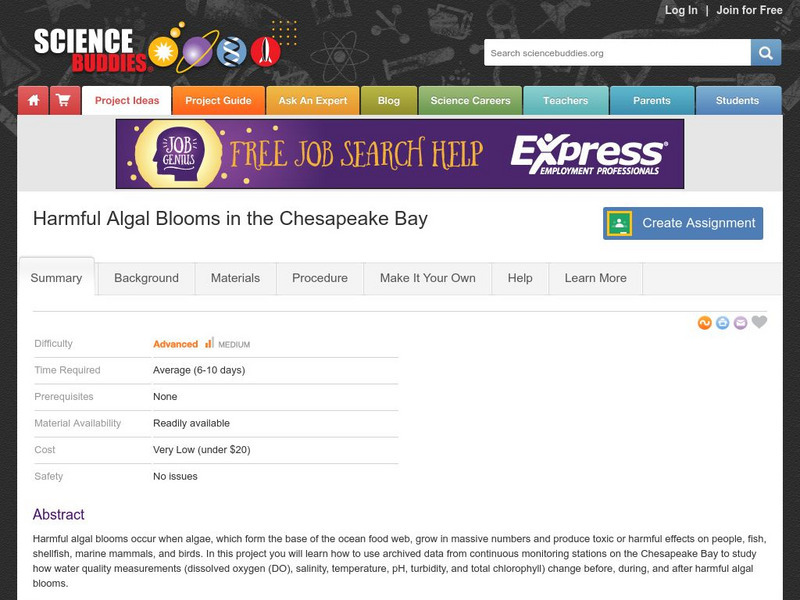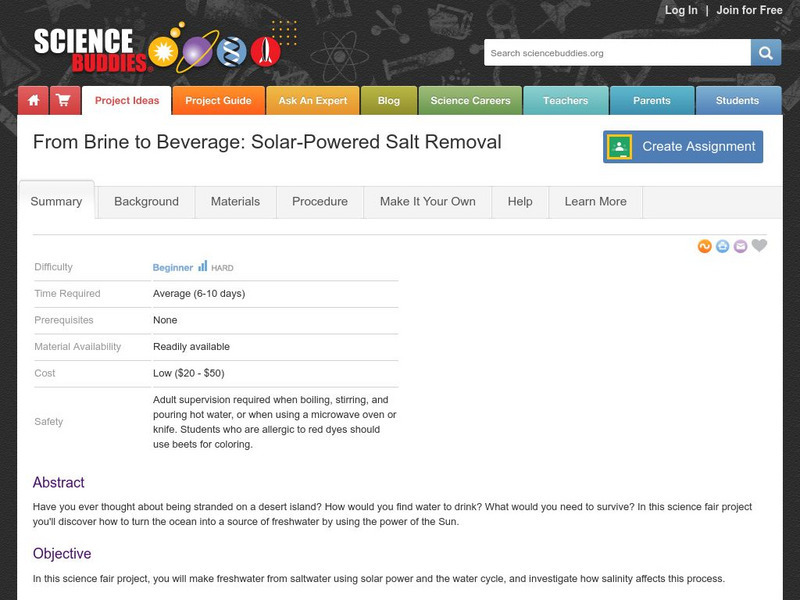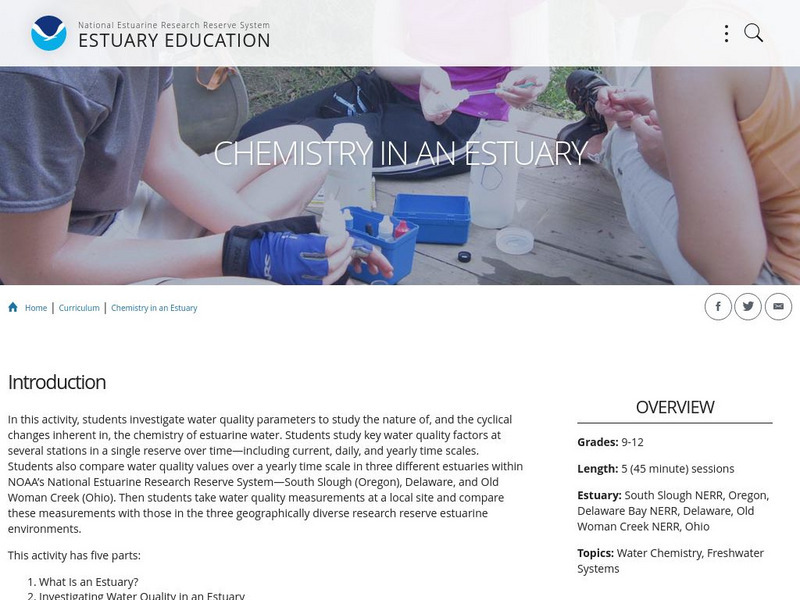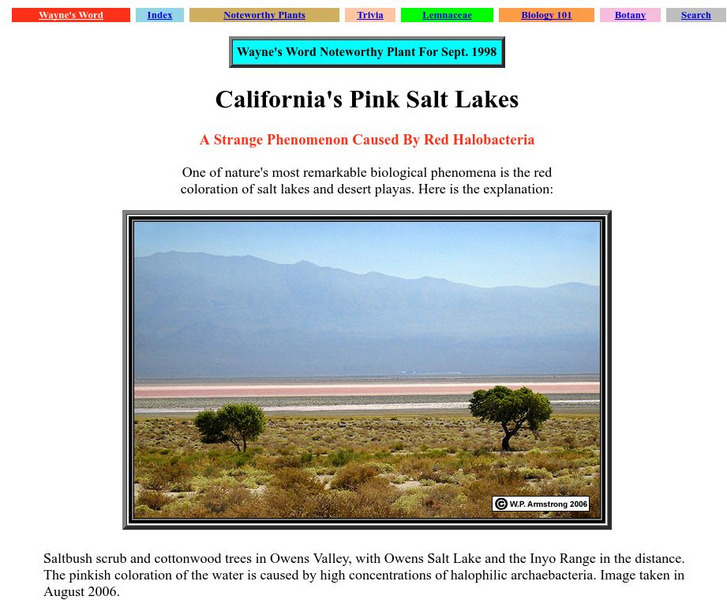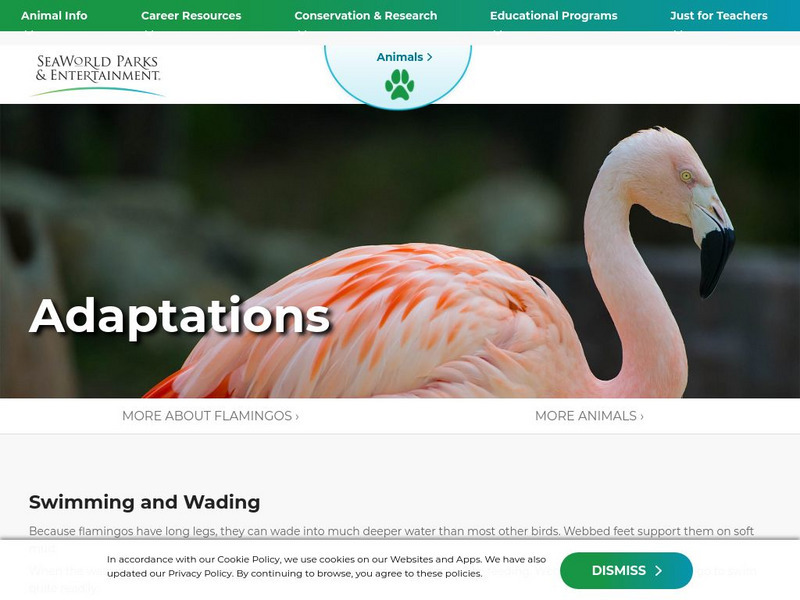Other
Nanoos: What's a Water Column Profile? [Pdf]
This lesson plan helps students discover the relationship between temperature, salinity, and density in coastal marine waters. Students access and retrieve water column profile data from the NANOOS and/or the WA Department of Ecology's...
American Museum of Natural History
American Museum of Natural History: O Logy: Stuff to Do: Density of Salty Water
An experiment to test what happens when ocean water hits a freshwater estuary. Each step is demonstrated with photographs and the difference between salinity and density is explained.
Enchanted Learning
Enchanted Learning: Zoom School: Oceans
Find out why the oceans are blue and what causes waves by clicking here. There is a table of information about the four oceans as well as interesting facts on waves, salinity, and tides.
Other
Saltland Genie: Finding Solutions for Saltland
Managing dryland salinity and its results on farmers, farm advisers, catchment managers and researchers/students. Guided information organized in 7 specific units.
NOAA
Noaa: Ocean Explorer: Hot, Cold, Fresh and Salty
Young scholars simulate ocean water characteristics in order to recognize that the effects of salinity and temperature are the drivers of thermohaline circulation.
US Geological Survey
Usgs: "Thirsty? How 'Bout Seawater?"
This U.S. Geological Survey website explains the desalinization method used by some communities to change sea water into drinking water. Click Home to access the site in Spanish.
Other
University of Texas at Dallas: Why Is the Sea Salty?
A clear and concise explanation of why some of the earth's waters are salty and others are not.
Science Buddies
Science Buddies: Harmful Algal Blooms in the Chesapeake Bay
Harmful algal blooms occur when algae, which form the base of the ocean food web, grow in massive numbers and produce toxic or harmful effects on people, fish, shellfish, marine mammals, and birds. In this project you will learn how to...
Science Buddies
Science Buddies: Can Water Float on Water?
Of course it can, you say: ice is water and ice floats. And you're right. But we're talking about water in the liquid phase Can liquid water float on water? The goal of this project is to investigate what happens to layers of water with...
Science Buddies
Science Buddies: From Brine to Beverage: Solar Powered Salt Removal
In this science fair project you'll discover how to turn the ocean into a source of freshwater by using the power of the Sun, and the water cycle. You will ultimately find just how salinity affects this process.
Science Education Resource Center at Carleton College
Serc: Ocean Water: Density
For this lesson students will learn about the stratification of the ocean by using a simulation to show the different densities. The simulation explores how temperature, salinity, and wind affect the development of water stratification.
CPALMS
Florida State University Cpalms: Florida Students: Diving the Depths of Underwater Life
A tutorial that explores how and why the distribution of aquatic life is affected by abiotic factors, such as light, temperature, and salinity.
NOAA
Noaa: Estuaries 101 Curriculum: Survival in an Estuary
This activity introduces students to the nature of estuaries, estuarine environmental factors, and four important abiotic factors-pH, temperature, dissolved oxygen, and salinity-and how they vary in estuaries. A PowerPoint presentation,...
Woods Hole Oceanographic Institution
Woods Hole Oceanography Institute: Deep Ocean Circulation
What causes the circulation of ocean waters that are too deep to be affected by wind? Find out how salinity and temperature drive the deep sea currents. This resource has several videos and an online quiz.
PBS
Pbs Learning Media: Great Ocean Conveyor Belt: Part I
This image from GRID-Arendal depicts the major circulation pattern of the ocean, illustrating interactions between temperature, salinity, and depth. Includes a background reading handout and several discussion questions.
NOAA
Noaa: Estuaries 101 Curriculum: Chemistry in an Estuary
This activity introduces students to the complex chemistry of estuarine water. Students investigate how chemical and physical water quality factors-pH, temperature, dissolved oxygen, and salinity-change and interact over varying time...
Palomar Community College District
Wayne's Word: Life on Salt Lakes
A fascinating report on some of the living things found in salty environments. There are terrific photos of salt flats colored red by some salt loving bacteria.
Sea World Parks & Entertainment
Sea World: Flamingos: Adaptations for an Aquatic Environment
Sea World's provides users with this comprehensive site about flamingos. Contains information on adaptations for their aquatic environment.
Other
Bscs: Restoring Oyster Reefs
In this self-directed lesson plan, students use data from the Chesapeake Bay estuary to determine suitable sites for oyster reef restoration. A handout with everything the student needs to complete this lesson plan is available as a PDF...
Science Struck
Science Struck: Density of Water at Room Temperature
Discusses how to calculate the density of water and how density varies depending on the temperature and the salinity. Presents a chart showing the difference in the density of non-saline water for temperatures between 0 and 100 degrees...
Texas Instruments
Texas Instruments: Dissolved Oxygen
Students use the Dissolved Oxygen Probe to measure the concentration of dissolved oxygen in water from streams and rivers. They correlate the availability of dissolved oxygen to temperature, pressure, and salinity.
Other
American Phytopathological Society: Effect of Environment on Plant Growth
In this experiment, students investigate how changes in salinity, temperature, and water availability affect the growth of plants.
Alabama Learning Exchange
Alex: What's Wrong With Global Climate Change?
Students will identify factors that affect the solubility of a salt and test one of the factors (temperature). They will apply their experience to ocean salinity, the effects of temperature on the composition of ocean water, and what...
University of Missouri
Famous Trials: The Trials of Dr. Jack Kevorkian (1992 99)
He called his invention "the thanatron." It was an inexpensive contraption. A jewelry chain, parts from an Erector Set, an old motor, an intravenous line, and three plastic bottles. One of the bottles contained a saline solution, another...
![Nanoos: What's a Water Column Profile? [Pdf] Lesson Plan Nanoos: What's a Water Column Profile? [Pdf] Lesson Plan](https://d15y2dacu3jp90.cloudfront.net/images/attachment_defaults/resource/large/FPO-knovation.png)

